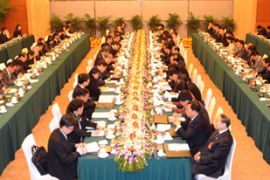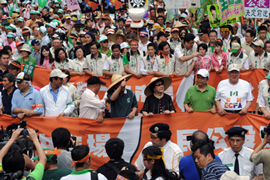China and Taiwan sign trade pact
Lifting of tariffs on 800 products seen as step towards closer political ties.

The agreement will end tariffs on hundreds of products traded across the strait, boosting bilateral trade already totalling more than $100bn a year.
It comes nearly two years after talks on the pact began, following Ma Ying-jeou taking over as Taiwan’s president, as part of his policy of seeking closer economic ties with China in an effort to ease tensions between the two sides.
Taiwan is expected to push China to agree to lower tariffs on exports, such as PVC plastics and high-tech items in the next round of talks.
‘Main course’
Future talks, also covering sensitive Taiwan-made cars and machine tools, will make up what Ma has described as a “post-ECFA era” some see as crucial to Taiwan’s continued economic success.
“The main course is still to come,” Ma has said.
Tuesday’s pact will cut tariffs to zero on 539 Taiwan export items worth $13.84bn bound for China versus 267 items valued at $2.86bn headed the other way.
 |
| Protesters in Taiwan have already expressed fierce opposition to the pact [AFP] |
Exporters will do cheaper business in China – already Taiwan’s biggest trade partner and top investment destination – as the tariffs disappear two years after the deal is signed.
Analysts say Beijing wants the trade deal less for its economic benefits than as a way to woo Taiwan into political reunification with China.
Melissa Chan, Al Jazeera’s correspondent in Beijing, said China has never made it a secret that its wants reunification with Taiwan.
“It considers Taiwan a breakaway island that should form a part of China,” she said.
“This deal doesn’t change what China or Taiwan think about the matter [of independence].
“Even though the pact will bring the two countries a lot closer, there are already a lot of Taiwanese doing business in China.”
‘Historical moment’
Alexander Huang, a director of the Graduate Institute of International Affairs and Strategic Studies at Tamkang University in Taiwan, told Al Jazeera that while the pact was only a framework agreement, the signing of it was a “very important, historical moment”.
And while political differences across the Taiwan Strait were still in place and there was “still a long way to go” in terms of political reconciliation, leaders on both sides have demonstrated that they are “committed to use negotiation instead of confrontation”.
Beijing wants to exert influence, though trade, over Taiwan, Huang said, but it remained to be seen whether China would be able to use the trade relationship to put pressure on Taiwan in political matters.
China has claimed self-ruled Taiwan since the Nationalists fled there in 1949 after losing the civil war, and relations have mostly remained tense in the ensuing six decades.
China’s attitude
Taiwan hopes China will let the ECFA lead the island to free-trade agreements with other major economies, such as Japan and the US.
But China has so far said it would forbid those FTAs because it does not recognise Taiwan as a sovereign nation.
Already, there has been fierce opposition in Taiwan against the trade agreement, which would increase if the ECFA fails to create the 260,000 Taiwan jobs expected, or fails to lift the island’s GDP by a forecast 1.7 per cent.
China may also try to push farm products on Taiwan despite farmer opposition, the island’s government has said.
Tens of thousands of protesters demonstrated in the capital Taipei on Saturday, saying the deal would undermine the island’s self-rule and economy.
Political profit
The opposition Democratic Progressive party [DPP], which organised the rally and has a strong anti-reunification stance, has called for a referendum on the pact.
The DPP says Taiwanese may gain short-term benefits from the tariff cuts, but many local factories may be forced to shut down within a few years under an onslaught of cheap Chinese goods.
Since losing the presidency to Ma’s Nationalist party in 2008, the DPP has won six out of seven legislative by-elections and scored important gains in a series of local polls.
It hopes to use unhappiness over the trade pact to achieve big gains in mayoral elections later this year and ultimately win the 2012 presidential election.
Polls, however, indicate that more Taiwanese support the trade pact than oppose it.